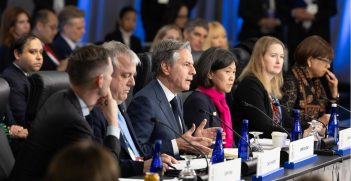18 October 2024: The Week in Australian Foreign Affairs

This week in Australian foreign affairs: Albanese reaffirms Australia’s commitment to ASEAN centrality; Abrams tanks to be sent to Ukraine; new humanitarian assistance to Myanmar, and more.
On 12 October, Prime Minister Anthony Albanese released a statement reaffirming Australia’s commitment to ASEAN centrality and to building Australia’s links with Southeast Asia. Albanese also “emphasised that dialogue and a strong ASEAN underpins regional stability, helps prevent conflict, and reinforces rules, norms and international law.” Across the summit, he met with “leaders from China, Laos, Vietnam, Thailand, Timor-Leste, Japan, the Republic of Korea, Canada and New Zealand.” The PM also “participated in a meeting of the Asia Zero Emission Community, hosted by Prime Minister [Shigeru] Ishiba of Japan, where leaders recognised the need for regional efforts to accelerate decarbonisation and ensure energy security through the transition to net zero.” Additionally, in Vientiane, Albanese “hosted an event attended by the Prime Minister of Vietnam His Excellency Mr Pham Minh Chính, Australia’s Special Envoy for Southeast Asia Mr Nicholas Moore AO, and Southeast Asian and Australian business representatives.” The PM “thanked Laos for being the 2024 ASEAN Chair. He announced Australia had committed an additional $4.5 million to Monash University’s World Mosquito Program to assist in the elimination of dengue fever in Laos.”
Australia is set to provide Abrams tanks to Ukraine. On 17 October Deputy Prime Minister and Minister for Defence Richard Marles joined Minister for Defence Industry and Capability Delivery and Minister for International Development and the Pacific Pat Conroy to announce the gifting of 49 M1A1 Abrams tanks to Ukraine. The package is valued at approximately AUD$245 million and will bring the total value of Australia’s military assistance to Ukraine to over $1.3 billion. “As was announced in January 2022, the Australian Army M1A1 Abrams are to be replaced by the M1A2 fleet. To support the transition, the Australian Army will retain a small number of M1A1 Abrams tanks to assist the introduction of the new M1A2 fleet,” the statement read. Conroy will travel to the NATO Defence Ministers’ Meeting in Brussels to confirm this news directly with his Ukrainian counterpart.
Minister for Foreign Affairs Penny Wong joined Conroy on 14 October to announce new humanitarian assistance to Myanmar. “ Top of FormAustralia will provide $9 million to Myanmar through the Australian Humanitarian Partnership to support communities and conflict-affected populations,” according to the statement. This brings “Australia’s total humanitarian commitment to the crises in Myanmar and Bangladesh since 2017 to $880 million.” The statement also clarifies that “Australia does not provide any direct funding to the military regime and takes proactive steps to ensure our assistance does not legitimise the military regime in Myanmar.” In addition to assistance, the Australian Government also welcomes the “release of $17.8 million (US$12 million) to respond to the crisis in Myanmar from the UN Central Emergency Response Fund (CERF). Australia is a longstanding donor to the CERF, contributing $11 million each year.”
On 15 October, Wong announced new targeted financial sanctions and travel bans on five Iranian individuals contributing to Iran’s missile program. According to the statement, “Iran’s 1 October launch of over 180 ballistic missiles against Israel was a dangerous escalation that increased the risk of a wider regional war.” The sanctions include “Directors and a senior official in Iran’s Aerospace Industries Organization, the Director of the Shahid Bagheri Industrial Group, and the Commercial Director of the Shahid Hemmat Industrial Group.” This brings the number of sanctioned Iran-linked individuals, including Islamic Revolutionary Guard Corps, to 200.
Wong and Conroy on 16 October announced a new humanitarian policy. “The Policy outlines the role Australia will play when need is outstripping the world’s capacity to respond, and disregard for international humanitarian law is increasing,” and focuses on three priorities. These include: “Building readiness and preparedness to anticipate shocks before they occur and working with our international partners to lessen their impact; Responding to crises and disasters by delivering support that meets the needs of crisis-affected populations and protects the most vulnerable immediately and in the long-term; and Reinforcing the international humanitarian system and taking principled and practical steps to strengthen adherence to international humanitarian law.” The policy maintains a focus on the Indo-Pacific and provides AUD$5 million to support a newly-established Asia-Pacific Regional Humanitarian Fund “to rapidly respond to escalation in humanitarian needs in complex crises and disasters in our region.”
Also on 16 October, the Government announced it was entering into negotiations with the Mongolian Government for a bilateral social security agreement. Wong joined Minister for Social Services Amanda Rishworth to present the new agreement, which seeks to “enhance access to certain Australian and Mongolian social security benefits for eligible people who have lived and/or worked in both countries.” The agreement is touted to “deepen our cooperation across a range of areas including our people-to-people ties, economic and education linkages” as well as encourage trade and investment between our two countries.
Wong has announced a new monitoring team for violations of UN sanctions on North Korea. In A media release on 17 October, new efforts to hold North Korea to account for violations and evasions of UN Security Resolution sanctions were addressed. Australia will join Canada, France, Germany, Italy, Japan, the Netherlands, the Republic of Korea, New Zealand, the United Kingdom and the United States in “establishing a member state-led Multilateral Sanctions Monitoring Team (MSMT) to monitor and highlight North Korea’s sanctions non-compliance.” North Korea’s ongoing pursuit of weapons of mass destruction and their delivery systems, its malicious cyber activities, and supply of arms and related materiel to Russia in support of Russia’s illegal war against Ukraine pose a serious threat to international security. Currently, “all North Korea-related UN Security Council resolutions remain in effect and all UN Member States are required to implement them.”
Also on 17 October, Wong joined Minister for Trade and Tourism Don Farrell at the Australia-Vietnam Foreign Ministers’ Meeting and Economic Partnership Meeting in Adelaide. The meetings seek to “deepen our partnership as we work together to implement our shared vision for a peaceful, stable, and prosperous region,” the announcement read. On Friday, Wong will hold the sixth annual Australia-Vietnam Foreign Ministers’ Meeting to advance cooperation under our Comprehensive Strategic Partnership and address key regional challenges with Deputy Prime Minister and Minister of Foreign Affairs of Vietnam, Bui Thanh Son, and Minister of Planning and Investment of Vietnam Dr Nguyen Chi Dung. On Thursday, Farrell and Dung held the fourth Australia-Vietnam Economic Partnership Meeting, which aims to advance shared goals of “increasing two-way trade, tourism and investment, and deepening economic cooperation across Southeast Asia.” “Farrell will also give a keynote address at the inaugural Australia Vietnam Policy Institute Conference on trade diversification opportunities in Southeast Asia.”
Dr Adam Bartley is the managing editor for AIIA’s Australian Outlook and weekly columnist for The Week in Australian Foreign Affairs. He is a former Fulbright Scholar and non-resident fellow at the Elliot School for International Affairs, the George Washington University. Adam also has positions as post-doctoral fellow at the Centre for Cyber Security Research and Innovation RMIT University and as program manager of the AI Trilateral Experts Group. He can be found on Twitter here.
This article is published under a Creative Commons License and may be republished with attribution.





